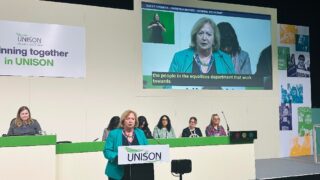When parliament reconvenes on 7 September, Brexit will be at the top of its agenda. Summer holidays over, it will be time to prepare for the end of an era.
It is expected that the two-year process of withdrawal from the EU will be painstakingly negotiated between the UK government and Brussels, from 2017 at the earliest.
And UNISON believes it is critical that it plays a part in those negotiations.
The trade unions share numerous concerns relating to the Brexit talks, including the need to protect public services, workers’ employment rights and trade union rights.
The risk that higher EU protections and standards may be replaced by lower ones in any new UK legislation must be challenged, while continuing the campaign against the government’s austerity agenda.
Many have been appalled by the rise in racist attacks and abuse since the referendum, on black communities, refugees and those perceived to be from migrant backgrounds.
UNISON supports the right to remain for EU citizens. Research suggests that 84% of the British public feels the same way – including 77% of Leave voters.
A seat at the table
In letters to Brexit secretary David Davies and international trade secretary Liam Fox, UNISON general secretary Dave Prentis said it is of the “utmost importance” that the negotiations aere open to “full parliamentary and public scrutiny” and that the devolved nations, English regions, business, trade unions and wider civil society should all be consulted.
Mr Prentis has asked for meetings with both ministers, to discuss the impacts of exit negotiations on public service provision in the UK.
A whole list of areas stand to be affected by Brexit, including: public procurement; the regulation of public-sector employers; future funding of public services; workplace and employment rights; equalities; health and safety; environmental standards; trade deals; free labour movement and immigration; and the statutory and legal frameworks in public provision and privatisation.
The union also intends to hold the Leave campaigners to account.
“The Brexit campaign promised extra money would be made available for public services, which would otherwise have gone to the EU,” says UNISON head of policy Sampson Low. “We are asking them to keep that promise. If we are no longer funding EU membership, we will need to know where the money’s going.”
At the same time, a variety of specific sector and regional concerns are already surfacing: from the potential loss of research funding within higher education and the government using Brexit as an opportunity to lower food hygiene standards, to threats to the peace process in Northern Ireland and the preservation of the free movement of people, goods and services across the Irish border.
In Scotland, UNISON is monitoring a number of initiatives from the Scottish government, the Scottish Labour Party and others, who are looking at the options for protecting Scotland from Brexit – ranging from independence, through a so-called ‘reverse Greenland’, where Scotland remains in the EU while the rest of the UK leaves, to federalism.
A union-wide Brexit strategy
All these issues and more will inform the work of a UNISON working group, charged with developing a union-wide Brexit strategy.
“The strategy will aim to make UNISON members feel supported by their union at a time of major change that could affect their lives at work and at home,” says Liz Snape, assistant general secretary for communications, campaigns and policy.
“Its principal aim will be to safeguard the future of our public services and those who work in it, as discussions and negotiations around exiting the EU get underway.”
The NEC’s policy development campaigns committee will consider the strategy on 4 October, before it is rolled out across the union.
But a number of initiatives are already underway.
- UNISON has submitted three motions to the TUC Congress, on 11–14 September, all Brexit-related: on protecting the worker and trade union rights gained through membership of the EU; calling for an immediate moratorium on public service cuts; and opposing the racial hatred, in and outside the workplace, that has increased since the referendum.
- The union is asking its members to write to their MPs, urging them to support Labour MP Melanie Onn’s 10-minute rule bill in Parliament on 7 September, which calls on the UK government to underpin workers’ rights with the minimum standards set by the EU.
- The Challenge Racism in the Workplace toolkit is being updated, as is the union’s race discrimination claims protocol.
- A new EU members’ network has been launched, to support the 67,000 members who are citizens of other EU countries or the family of EU citizens, and whose right to live and work here currently depends upon the country’s EU membership (find out more on Facebook).
- The union has already held meetings and an internet seminar with its EU members and other migrants, to start identifying some of the issues they face.
- It has also commissioned the Joint Council for the Welfare of Immigrants to provide a booklet for EEA nationals (which includes EU nationals) and their families in the UK, to inform and reassure them of their rights in this country. Download it now.
- And in the autumn, a UNISON EU network roadshow will be touring the regions, when the union will be listening to the concerns of members and talking about how it can campaign for the right to remain.
Watch this space
Meanwhile, the country waits for prime minister Theresa May to trigger Article 50 of the Lisbon Treaty to initiate the exit talks. The earliest she is expected to do so is January 2017.
“For now, employment rights remain the same, and immigration status remains the same. European law is still there and still to be used,” says Mr Low..
“But watch this space. It’s been such a fluid and fast-moving situation so far, and could become even more so once Article 50 is invoked. Everything is up in the air, and everything is still to fight for.”
For more information on the EU members network contact Greg Thomson, head of strategic organising: g.thomson@unison.co.uk or join our EU members Facebook page by emailing strategicorganising@unison.co.uk.
For further information on UNISON’s Exiting the EU Campaign Strategy, contact policy officer Allison Roche: a.roche@unison.co.uk Tel: 020 7121 5457.








